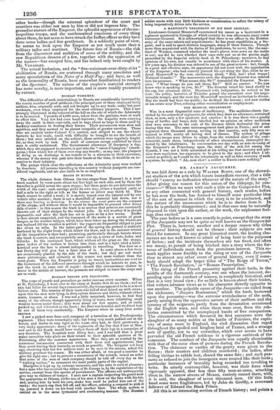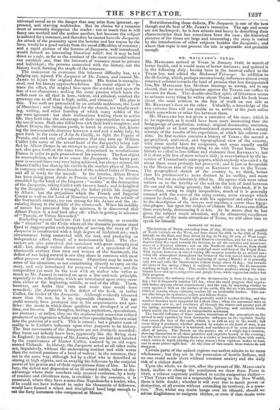MR. JAMES'S JACQUERIE.
IT was laid down as a rule by WALTER SCOTT, one of the shrewd- est studiers of the arts which insure immediate success, that a title should "convey no indication whatever of the nature of the story." After giving one reason for this canon of the titlepage, be con- tinues—" When we meet with such a title as the Gunpowder Plot, or any other connected with general history, each reader, before he has seen the book, has formed to himself some particular idea of the sort of manner in which the story is to be conducted, and the nature of the amusement which he is to derive from it. In this he is probably disappointed ; and in that case may be naturally disposed to visit upon the author, or the work, the unpleasant feel- ings thus excited."
The case before us is a case exactly in point, except that the story of the Jacquerie may not be quite so well known as the Gunpowder Plot. There is, however, another and a deeper reason wby titles of general history should not be chosen : their subjects are not fitted for romance. In any great historical event, the leading cha- racters are too well known to admit of being bent to the purposes of fiction ; and the incidents themselves are too fixed, and often too massy, to permit of being hitched into a story where the for- tunes of individuals must form the prominent interest. This re- mark applies more forcibly to the rising or war of the Jacquerie than to almost any other event of general history, even if some- body should adopt the larger titles of "The Reign of Terror," " The French Revolution," or " Roman Proscription." The rising of the French peasantry against their lords, in the middle of the fourteenth century, was one where the interest, de- pending upon the conduct of masses, is completely historical, and that in a very broad view ; for so little is known about their leader, that writers advance views as to his character directly opposite to one another. The palpable cause of the Jacquerie—so called from the nickname, "Jacques Bonhomme," which the lords bestowed upon the peasantry—was the extreme wretchedness of the serfs, partly arising from the oppressive nature of their serfdom and the tyranny of the seigneurs, partly from the devastation occasioned by the English wars, and when these were over, from the rob- beries committed by the unemployed bands of free companions. The circumstances which favoured its first successes were the slaughter of so many nobles at the battle of Poictiers, the capti- vity of many more in England, the civil dissension that raged throughout the spoiled and kingless land of France, and a strange sort of apathy, not to say cowardice, which ever seems to have pervaded the old French noblesse in a vigorous outbreak of the commons. The conduct of the Jacquerie was equally abominable with that of the same class of persons during the French Revolu- tion. The châteaux or castles of the gentry were given to the flames ; their masters and children murdered ; the ladies, after falling victims to rabble lust, shared the same fate ; and such pea- sants as refused to join the insurgents were treated like their lords ; particular instances of brutality being recorded too revolting to write. So utterly contemptible, however, was their force when vigorously opposed, that less than fifty men-at-arms, attacking them in the narrow streets of Meaux, entirely routed them, with, it is said, the slaughter of seven thousand men. Of this little band some were Englishmen, led by John de Greilly, a renowned follower of Edward the Black Prince.
All this is an interesting section of French history; and points a
universal moral as to the danger that may arise from ignorant, op- pressed, and starving multitudes. But its choice for a romance must of necessity disappoint the reader: not so much that he will fancy one method and the author another, but because the subject is unfitted for a romance, and therefore he cannot have the Jacquerie. An attack of the peasantry upon the heroine and her rescue by the hero, would be a good variety from the usual difficulties of romance ; and a rapid picture of the horrors of Jacquerie, well introduced, would furnish an interesting historical relief: but it may be laid down as a rule, so far as the conduct of the most successful writers can establish one, that- the interests of romance must be private and individual ; the persons connected with the history, not the history itself, forming the staple of the romance. The endeavour to overcome this inherent difficulty has, to a judging eye, injured The Jacquerie of Mr. JAMES, and caused Mr. JAMES to injure the original Jacquerie. His fiction is metaphy- sical, and his history approaches fiction. His moral object is " to trace the effect, the original bias upon the conduct and upon the fate of two characters; making the same passion which leads the selfish man to all that is base, violent, and criminal, conduct the generous one to all that is high, noble, and virtuous." His plan is this. Two serfs are patronized by an amiable nobleman, the Lord of Mauvinet ; and being designed for the church, are taught read- ing, writing, and other learning of which many nobles of the age were ignorant : but their inclinations leading them to active life, they both take the advantage of their opportunities to acquire the use of arms. Both also fall-in love with their lord's daughter; and Albert Denyn, the virtuous youth, is loved in return ; but, know- ing the immeasurable distance between a serf and a noble lady, he goes forth in the train of John de Greilly, to fight the Pagans of Prussia, and seek any other adventures that may turn up. William Caillet (the name of the actual head of the Jacquerie) being baf- fled by Albert Denyn in an attempt to carry off Adele de Mauvi- net, also goes forth at the same time, determined to revolutionize France in order to gain possession of his mistress. The first object he accomplishes, so far as to cause the Jacquerie : the latter pur- pose is several times very near being achieved, but always missed, till Master Caillet has shut up his victim in the market-place of Meaux, in company with some three hundred of the noblest ladies of France, and all is ready for the assault. In the interim, Albert Deny n has been doing great deeds iu Prussia and Germany ; he returns ennobled by the hand of the Emperor ; "assists" at the destruction of the Jacquerie, taking Caillet with his own hand ; and is knighted by the Dauphin. After a struggle, the father yields his daughter to Albert : but the prejudices which the French and Imperial Courts as well as the Lord of Mauvinct overcame, in the middle of the fourteenth century, are too strong for Mr. James and the cir- culating library in the middle of the nineteenth. When his nobility of nature has procured him his mistress, it is discovered that Albert Denyn is a real lord after all : which is getting in advance of " Pamela, or Virtue Rewarded."
Excluding several incidents that lead to nothing, or resemble the " situation" in the Critic where all the dramatis personae stand fixed at daggers-point each incapable of moving, the story of The Jacquerie is constructed with a high degree of technical art ; each circumstance being connected with the rest, and producing an independent effect, though of a melodramatic kind. The cha- racters are also conceived and sustained with great metaphysical skill : but, though rather clever creations of a speculator of the nineteenth century than men and women of the fourteenth, the defect of not being natural is one they share in common with most other persons of historical romance. Objections may be made to some of the situations, as not contributing directly to carry on the story, and only introduced for purposes of excitement ; and the composition (as must be the case with an author who writes so much as Mr. James) is carried on upon a line-and-rule principle, especially in the reflections, which are introduced upon every occa- sion, either at the beginning, middle, or end of the affair. These, however, are faults that care and more time would have remedied : the Jacquerie is the defect of the book, or rather Caillet, the leader of the Jacquerie. Although evidently laboured more than the rest, he is an impossible character. The age could scarcely have produced him in his acquirements and qua- lities: the mode in which those qualities are developed is of our time, not his own. His thoughts, feelings, aspirations, speculations, are abstract ; or rather, they are the studious and somewhat refined products of an ingenious scholar and writer speculating his own mind into the position of a serf's. This is unreal ; but a greater want of reality is in Caillet's influence upon what purports to be history. The first movements of the Jacquerie are not distinctly recorded ; they burst out nobody knew how, apparently like the Swing riots in England : in the romance of Mr. JAMES, they are laid and hatched by the contrivances of Master .Caillet, assisted by an old rogue named Thibault. In history, the Jacquerie acted as all other mobs act, impulsively, without the undeviating instinct and with worse than the animal passions of a herd of wolves : in the romance, they act in the same way, although led by a chief who is described as aiming at high objects, and as swaying his followers by the conjoint power of his genius and of their superstitious fears of him. In his- tory, the defeat and dispersion of an ill-armed rabble, taken at dis- advantage where their numbers only created confusion, by a body of resolute and chivalrous men, is credible : in the romance, it is unnatural, where they have a more than Napoleon for a leader, who, if he could not have reduced to order his thousands of followers, would have formed a select and disciplined band large enough to eat the forty horsemen who conquered at Meaux. Notwithstanding these defects, The Jacquerie is one of the best though not the best of Mr. JAMES'S romances. The age and scene are not hackneyed ; he is less minute and heavy in describing their characteristics than has sometimes been the case ; the historical pictures of the times are large and interesting ; the story is varied by the introduction of other subjects besides the Jacquerie ; and where that topic is not present the tale is agreeable and probable enough.























 Previous page
Previous page